It's official: TODAY viewers have named "M*A*S*H" the best TV finale ever!

As viewers anticipate the final episode of "Mad Men," set to air this Sunday, TODAY decided to look back at some of the most unforgettable finales in television history.
Each day this week, viewers voted on a new round of small-screen showdowns — from classic sitcoms like "The Mary Tyler Moore Show" and "The Golden Girls" to groundbreaking dramas, such as "Breaking Bad" and "The Sopranos."
It all came down to a final face-off between "Cheers" and "M*A*S*H." And while sometimes you want to go where everybody knows your name, it's clear that "M*A*S*H," which shattered records ratings and remained the most-watched TV broadcast in U.S. history until Super Bowl XLIV in 2010, is America's favorite.
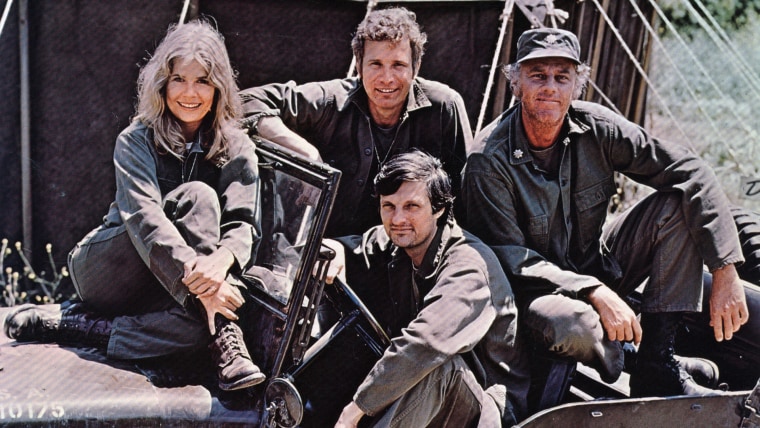
Download the bracket here for a closer look.
This story was originally published on Monday, May 11. TODAY editors wrote defenses for their personal favorites! Check out the original showdowns:
“Friends” vs. “Buffy the Vampire Slayer”
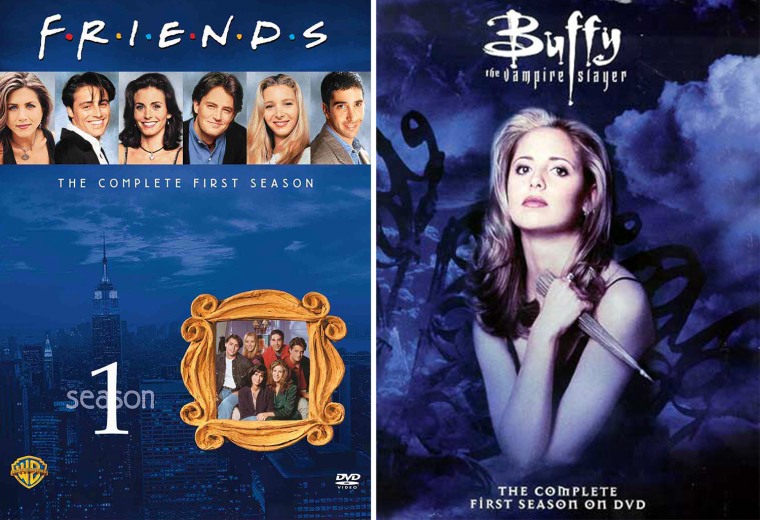
“Friends”
The “Friends” finale was memorable for two words: Ross and Rachel. Over the years, we watched them go “on a break” (and off one), drunkenly marry in Vegas, get divorced, have a baby — the list goes on. But even though these events happened slightly out of order, Ross and Rachel had to wind up together — they were each other’s lobsters. It didn’t stop there though; we also got the joy of seeing everyone else start a new chapter in their lives: Monica and Chandler got the surprising birth of twins and a new home in the suburbs, Phoebe got married life with Mike, and Joey got the apartment — minus the foosball table but with his sidekicks, the chick and the duck. What was truly bittersweet was the gang's final trip to get coffee, which brought fans back to Central Perk, where it all began. Thanks for always being there for us, “Friends,” when our job’s a joke, we’re broke, and our love life’s D.O.A. — Danielle Brennan, TODAY.com editor
“Buffy the Vampire Slayer”
After seven monster-and-metaphor-filled seasons of life on the hellmouth, "Buffy the Vampire Slayer" had a lot to live up to in the finale — and plenty to kill off. (RIP, Anya. RIP-for-a-while, Spike.) In the end, the show's underworld-weary heroine faced off against the ultimate evil (and a horde of ubervamps) and learned some pretty important lessons. For instance, she didn't have to dutifully sacrifice herself to the fray, because the big faceoff wasn't just her fight. Thanks to her friends (and a little magic), she wasn't the-one-and-only chosen one anymore. And when it came time to think of her future with a certain special guy, she put herself first instead. "I'm cookie dough," she said in what maybe TV's best it's-not-you-it's-me speech. "I'm not done baking. I'm not finished becoming whoever the hell it is I'm gonna turn out to be. ... Maybe one day, I turn around and realize I'm ready — I'm cookies. And then, you know, if I want someone to eat, er, enjoy warm, delicious cookie-me, then that's fine. That'll be then. When I'm done." It was simple, powerful and perfect. — Ree Hines, TODAY.com writer
“The Mary Tyler Moore Show” vs. “Lost”
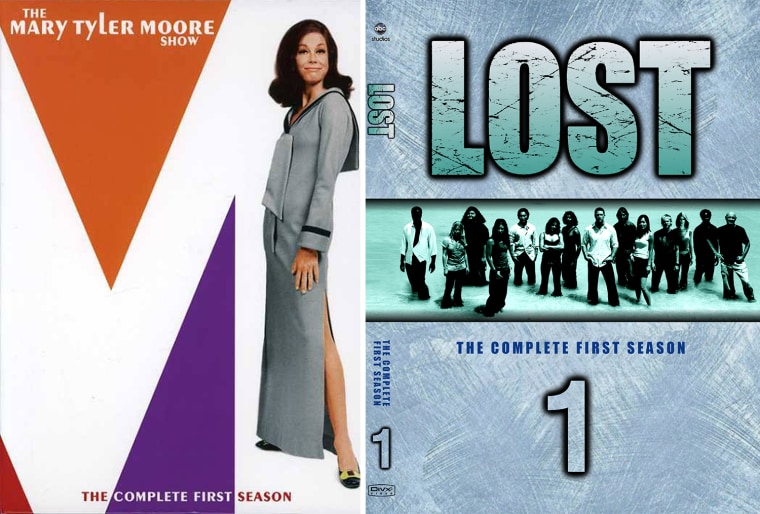
“The Mary Tyler Moore Show”
There are no cheap gimmicks or neatly tied bows in the final episode of "The Mary Tyler Moore Show." Mary doesn't end up married or even with a serious boyfriend. She doesn't get a big promotion. In fact, she and the rest of the gang from WJM end up being fired — all of them except the idiotic (yet lovable) anchorman, Ted Baxter. (Pretty relatable to anyone who's ever been downsized.) It's this lack of neatness that makes the ending so perfect — so real-life, like the rest of the show. And though her life isn't ideal when the show ends, Mary's parting words provide the perfect closure to the series: "Sometimes I get concerned about being a career woman. I get to thinking my job is too important to me. And I tell myself that the people I work with are just the people I work with and not my family. And last night I thought, 'What is a family, anyway?' They're just people who make you feel less alone and really loved.' And that's what you've done for me. Thank you for being my family." And we know, as the theme song says, Mary Richards, "You're going to make it after all..." — Megan Steintrager, TODAY.com editor
“Lost”
What did the numbers mean? Were the characters dead all along? What was the point of it all? Has there been another show ending more divisive and overanalyzed as the finale of "Lost"? Maybe there was “another way, a better way,” to end it. Maybe, after six seasons following the survivors of Oceanic Flight 815 and their epic efforts to escape the mysterious island, we could have been given a tidy wrap-up. Twists (flash-sideways world), conspiracies (Dharma Initiative vs. the Others) and mythologies (who is Jacob, really?), all resolved. Instead, the mysteries were left hanging. The final moments stripped away the science-fiction machinery and went right to the emotional heart of the story. Dropping spiritual clues like crumbs in the forest, the finale tells us, if we’re lucky, we’ll wake up like the Buddha, resolve those Daddy issues and find peace in the now. If we’re lucky, we’ll go to eternity with the people we love. "Lost" was an imperfect mythology, but that’s its power. Real world mysteries aren’t solved. Scientific experiments don’t always yield definitive answers. Messy breakups are the ones we remember. “No one can tell you why you’re here, Kate, certainly not me,” says Desmond in the finale episode, in a moment of existential clarity. “Nobody does it alone, Jack,” Christian Shephard tells his son. You said it, brother. — Jane Weaver, TODAY.com editor
"Cheers" vs. "Six Feet Under"
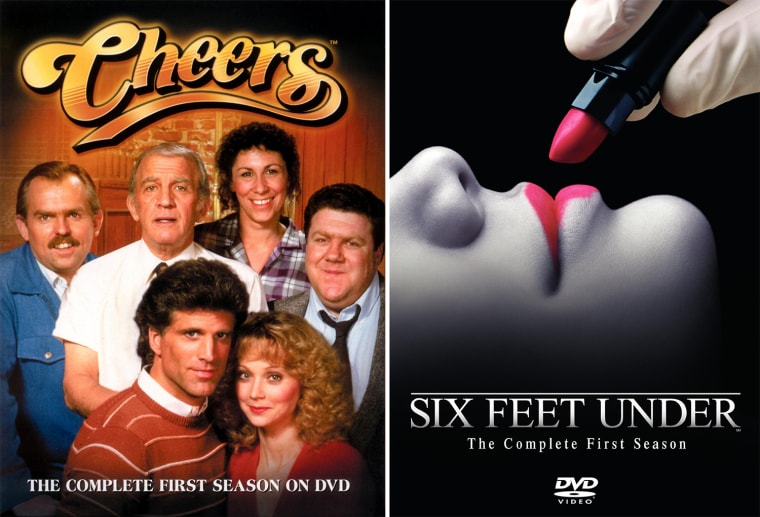
"Cheers"
There is beauty and brilliance in the "Cheers" finale and both are buttressed by its simplicity. All the big events, except one, happen before the finale: Rebecca ends up happy and basically only makes a cameo in the final episode; Woody and Norm get on track; there is, of course, no ridiculous death to pull at heart strings. Sam decides not to move to LA with Diane and returns to the bar, his true love, but there's no montage set to pop music to tell you how to feel. You don't need it because "Cheers" was a heartfelt show that lived and died by the relationship between Sam and the regulars, and, at the end, that's all there is, a bunch of friends happy to spend time with one another, aware that it will end one day. Their final conversation is about life and death and friendship, which makes the show's iconic final line all that more powerful: Sam looking toward a silhouette standing in for the audience at the door of the bar and saying, truthfully and simply: "We're closed." — Matt Toder, TODAY original video producer
"Six Feet Under"
The last minutes of “Six Feet Under” are perhaps the best possible example of a solid series finale: A tribute not only to the characters of the show — which was centered on a family running a funeral home in the wake of their patriarch’s demise — but to the style and tone of the entire production. After 63 episodes, each of which began with the death of a (usually) non-canonical character and a fade to white, “Six Feet” wrapped things up in 2005 as youngest Fisher child Claire set out on a cross-country drive to her new life. As she did, the show flashed forward, showing how every major character from the series would eventually pass away — all set to the haunting strains of Sia’s “Breathe Me.” It was the opposite of depressing: Characters left the world in bed and on cruise ships, working and playing, and each departure was transcendently heartfelt and incredibly human. In the end, we were shown that yes, death comes for us all — but life goes on. — Randee Dawn, TODAY.com writer
"The Sopranos" vs. "Felicity"
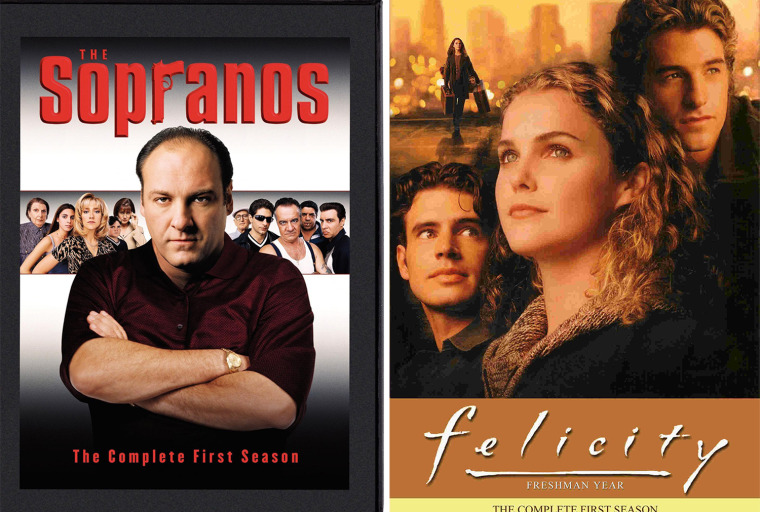
"The Sopranos"
The famed “fade to black” has often been maligned. But there’s a gritty realness to the "Sopranos” finale leaving us hanging because, like life itself, it wasn’t handed to us neatly with loose ends tied up in a bow. There’s no closure. But then, when in life do we ever get closure? We’re reminded by A.J. that Tony once told him to “remember the good times,” which is what the show was asking us to do as well. Did we really need to see Tony die? The show’s fadeout to “Don’t Stop Believin’” allows us to remember Tony however we choose to. — Vidya Rao, TODAY.com editor
"Felicity"
The final “Felicity” season was a rollercoaster that saw our curly-haired heroine (now with a sleeker ‘do) juggling a painful love triangle, plagiarism and the shocking news that Ben got another woman pregnant. Luckily, things end well in the graduation episode, when she moves away only to have Ben follow her to school. If your eyes don’t fill with tears when he shows up, you’re not human. But after graduation, “Felicity” was picked up for five more episodes, so the writers sent her back in time (literally) to see what would have happened if she’d made different choices. In the finale, Felicity has to time travel again to undo Noel’s death — a flimsy excuse to cue the show’s best flashbacks, but we’ll allow it. Thankfully, Ben and Felicity still end up together, Noel comes back from the dead, and even Elena — who died in a prior episode — is resurrected. After a slow-motion montage of the gang in their finest early-2000s fashions, the show closes on a young, ringleted Felicity — achieving exactly what a perfect finale should: It makes you want to immediately go back to the first episode and start watching all over again. — Meena Duerson, TODAY.com editor
"Sex and the City" vs. "How I Met Your Mother"
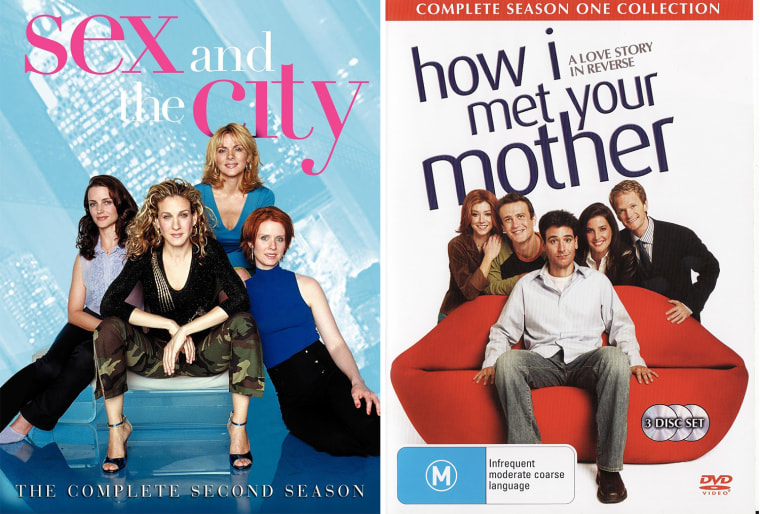
"Sex and the City"
When a TV show comes to an end, I like to know that all the characters I've come to love are going to be okay. That even when I'm not seeing what they're up to each week, those fictitious lives will continue on, and hopefully bring my "friends" some peace, happiness, and yes, love. The "Sex and the City" finale does just that. After six years of ups and downs for our four main characters, we see each woman in a good place in her life as the final song plays. While some may dismiss this finale as a fairy tale, or counter to the show's strong-and-independent-female message, in that each woman has a man in her life, and is thus happy, the idealist and the romantic in me doesn't mind. I'm just happy that they're happy, and as Carrie Bradshaw says in those final moments: "If you can find someone to love the you you love, well, that's just fabulous." — Zoe Marcus, TODAY producer
"How I Met Your Mother"
The conclusion of “How I Met Your Mother” inspired questions like “Can a finale ruin a series?” and even “Is this an April fool’s joke?” But despite the harsh critiques, the final episode is completely in line with the rest of the series. While the show wore all the armor of a traditional sitcom (stale laugh track, unrealistically big apartments), it always had a bit of a dark side."HIMYM" was at its best when dealing with more realistic themes and issues. Of course, it’s incredibly sad that Barney and Robin’s marriage crumbled. It’s even more heartbreaking that “the gang” doesn’t hang out as often in the future — but it’s also fairly realistic after kids, moving to different locations and a divorce in the group. No wonder Ted is so nostalgic for the triumphs and failures of his 20s and 30s. Perhaps he’s telling his adolescent kids to enjoy being young and to trust in the (often rocky) journey. Which brings us to Tracy: Ted doesn’t have to go into the nitty-gritty details of her illness and subsequent death with his children; they endured it. And after six years of mourning his wife and the mother of his children, shouldn’t we agree with his kids? Doesn’t Ted deserve to (try to) be happy? — Emily Sher, TODAY.com editor
"Newhart" vs. "Friday Night Lights"
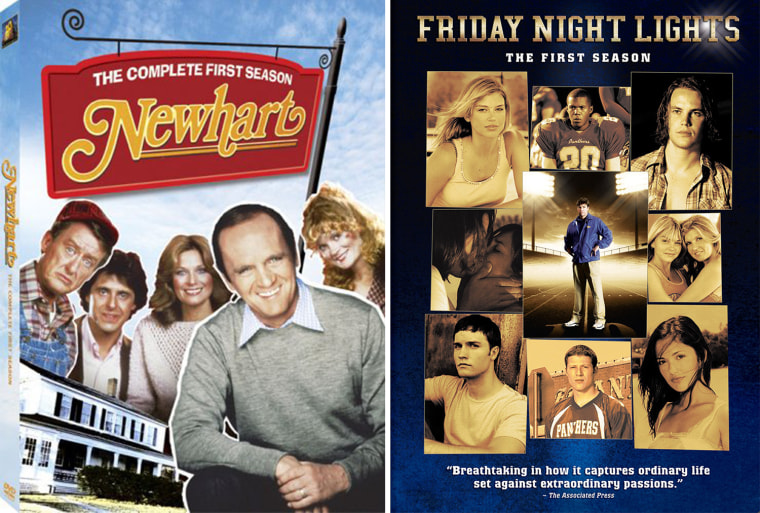
"Newhart"
When it comes to classic television finales, "Newhart" flipped the script on how it's done — literally. For eight seasons, Bob Newhart played Dick Loudon, a Vermont innkeeper, a TV talk host, a man burdened by oddballs and blessed with lovely wife Joanna (Mary Frann). But in the final moments of the final episode, all of that changed. In the ultimate prime-time switcheroo, the show's leading man woke up in a very different, yet very familiar, setting — the bedroom from the old "Bob Newhart Show." And lying beside him was his lovely wife, Emily (Suzanne Pleshette). "Honey, wake up!" he said with a start. "You won't believe the dream I just had. "Yes, the entire series was just that — a dream, and it was also a fitting and hilarious sendoff to show that celebrated the odd, offbeat and eccentric with every single episode. — Ree Hines, TODAY.com writer
"Friday Night Lights"
If you still get teary-eyed when you think back on NBC’s "Friday Night Lights," it’s probably because, like me, you’re still recovering from the last 20 minutes of the series finale — a full-on lovefest that solidifies Kyle Chandler’s Coach Taylor as the world champion of father figures. (I actually wept — WEPT — when, just minutes before the big game, he assured Vince, “You may never know how I proud I am of you” and his QB 1 responded with, “You changed my life, Coach.") It also proves once and for all that he is one-half of the best marriage in television history. Landing Coach, Mrs. T and her lustrous locks in Philadelphia (because it was her turn, babe) with a new squad set to learn the meaning of “Clear eyes. Full hearts. Can’t Lose.” was the perfect end. — Lauren Sullivan, TODAY.com editor
“M*A*S*H” vs. “Seinfeld”
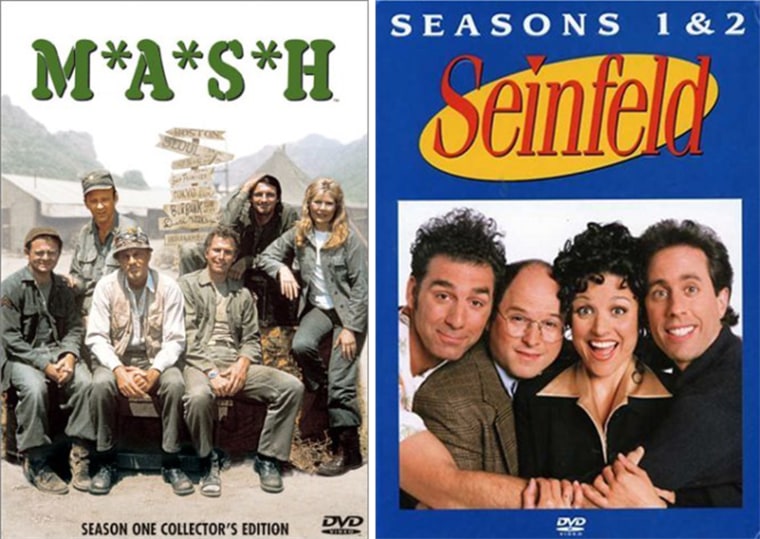
“M*A*S*H”
“M*A*S*H” never jumped the shark. Instead it evolved, all the way to the end.The show began in 1972 as a sanitized version of director Robert Altman’s 1970 antiwar comedy about a U.S. medical field unit during the Korean War. But over its 11 seasons on CBS, it restlessly stretched the limits of the service sitcom, mingling comedy with drama (as in the startling death of Henry Blake at the end of Season 3). “Goodbye, Farewell and Amen,” the show’s two-and-a-half-hour final episode, continued breaking boundaries when it aired Feb. 28, 1983. As it revealed why Hawkeye Pierce (played by series star Alan Alda, who also directed) was in a mental hospital in the final days of the war and wrapped his supporting characters’ storylines, it also delivered heartbreak (a baby is smothered to death by its mother lest its crying attract the enemy; Chinese musicians are needlessly killed mere hours before hostilities cease) along with laughter and sentimental tears. It also shattered records ratings: it remained the most-watched TV broadcast in U.S. history until Super Bowl XLIV in 2010. — Rick Schindler, TODAY.com editor
“Seinfeld”
"Seinfeld" wasn't just revolutionary as a "show about nothing," it was incredibly subversive of its genre. The writer's room ethos of "no hugging, no learning" set the show apart as not just better than its competition but as the antithesis of sitcoms like "Home Improvement" and "Cybil." The finale pushed this to its logical conclusion. First, it teased the feel-good endings that critics and fans had hoped for: "Jerry!" getting picked up, the gang moving to LA and Jerry and Elaine ending up happy together. Then it flipped the script and gave us the truth: For the past nine years, we had been rooting for terrible people. And that makes the finale both true to the show and great in its own right. If a great show subverts your expectations every episode, shouldn't a great finale do that too? — Matt Toder, TODAY orginal video producer
“Breaking Bad” vs. “The Golden Girls”
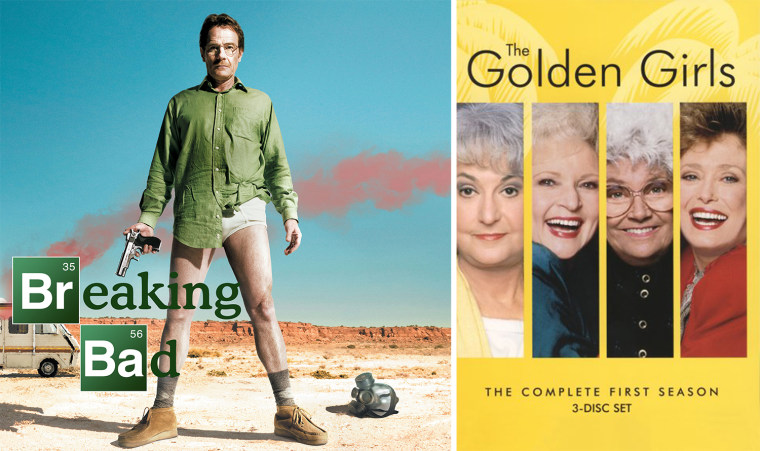
“Breaking Bad”
If “Breaking Bad” was meant to be a slow burn following antihero Walter White’s slide from innocent high school chemistry teacher to meth kingpin, then the final episode was an explosive stick of dynamite. “Breaking Bad” had the near-impossible task of delivering a finale that lived up to the hype that had built around the series as a whole — and somehow it delivered. At its core, the show was the story of Walter White facing his impending death, whether it was to come at the hands of his cancer, his enemies or his hubris. The finale showed us a man who had finally accepted his fate, while also accepting who he really was. For five seasons, Walter White insisted he had been cooking meth as a means to provide for his family when he was gone. But we saw him disappear for good in his final conversation with Skyler: "I did it for me," he admits. "I liked it. I was good at it … I was alive." The series began with Walter White teaching in a chemistry lab, and it ended with Heisenberg dying on the floor of a meth lab. As a viewer, you’re not quite able to pinpoint the moment Walter White finally became Heisenberg — showrunner Vince Gilligan wouldn’t want you to — but I bet Heisenberg would tell you he felt more alive bleeding out on the floor of that meth lab than he ever did in that classroom. — Matt Murray, TODAY.com editor
“The Golden Girls”
An awkward blind date, a clever prank, an unexpected wedding and a tearful goodbye made for a finale full of the wit and warmth that served as the show's hallmarks all seven seasons. Blanche has plans the same night her Uncle Lucas (Leslie Nielsen) is visiting and pawns him off on Dorothy, telling each that the other is eager to meet. But when Dorothy and Lucas realize they were lied to, they scheme to teach Blanche a lesson by pretending the evening went so well that they're getting married. During the elaborate ruse, they decide to wed for real, and Dorothy ends up moving out of the foursome's Miami house to live with Lucas in Atlanta. Dorothy's nonexistent love life was a frequent target of the other girls' barbs (Rose: "If you ask me, Blanche, your Uncle Lucas is nothing but desperate, pathetic and lonely. Hey, Dorothy, you two just might hit it off!"). So, her marriage was a sweet twist (even if it paved the way for the remaining cast members’ unsuccessful spinoff, "Golden Palace”). As Rose aptly puts it in the emotional final scene, "What can you say about seven years of fights and laughter, secrets, cheesecake?" — Erin Clements, TODAY.com editor